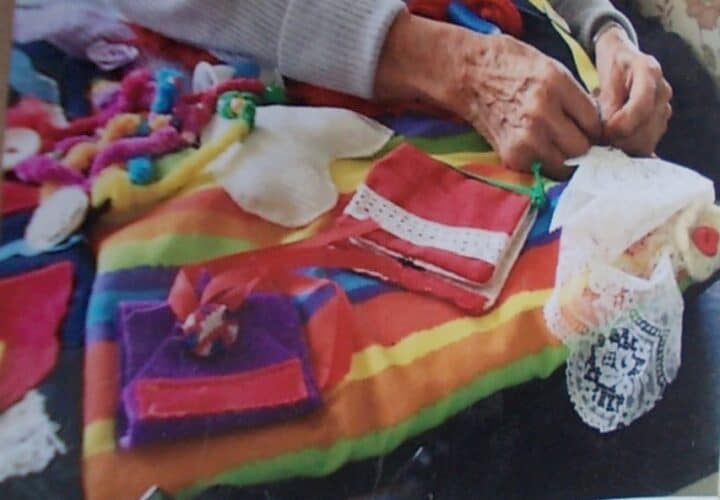Shopping for a loved one with Alzheimer's or dementia? You might see fidget quilts, fidget boxes, even fidget mittens on holiday gift lists this year. Here's why.
Sharon Elin of Mechanicsville, Virginia had noticed that, as her brother Chad’s memory declined, he was becoming increasingly restless, spending hours fiddling about, carrying out the same habits, like folding towels, or moving bird feeders around on his porch. “That’s when I started thinking that maybe a ‘busy box’ would help,” Elin recently told the Washington Post. Elin had seen similar items to keep people’s hands busy, often cloth items like quilts or aprons, with zippers, Velcro, beads and ribbon. But Chad had always liked tinkering with tools, she said. “I thought he’d enjoy something that had hardware on it … I envisioned putting little surprises inside for him to find, like a new baseball cap or a pair of socks.”
Elin found a volunteer on Reddit to help build this “busy box” or “fidget box” for Chad, who, at age 70, will soon move from home with his wife in rural North Carolina to a care center. Anxiety and agitation are symptoms of Alzheimer’s and dementia, and often, people will channel these symptoms through restless hands — wringing, rubbing or twisting their fingers, pulling or rubbing at clothes or bedding. Elin said she plans to gift him the fidget box once he is settled in, with hopes it will help keep his nervous energy occupied — and there’s a chance that it will: Research has shown that touch-based therapy, known as sensory therapy, has the potential to harness that nervous energy, reduce anxiety and offer comfort.
In fact, the approach has given rise to entire product lines: Melanie Oliver in Knysna, South Africa, is a designer of “fidget products” for people living with Alzheimer’s and dementia, for Thera Sense Fidget Products and African Alzheimer Fidget Products.
“Folks with dementia get changes to their visual cortex, so narrowed peripheral vision, problems with color and pattern contrast, problems with depth of field, seeing white and clear, or shiny surfaces,” Oliver recently shared with Being Patient. “I design fidget products for folks with dementia and have had to design for folks with macular degeneration and other visual disorders. The trick is to use sensory features to orientate the LO,” the brain’s lateral-occipital cortex, she explained.
“I make fidget aprons, blankets, cushions, quilts, twiddle muffs for Alzheimer’s and dementia folk, but also the odd thing for autistic kids and folks with other neurological disorders,” she said.
Indeed, these fidget gifts for people living with Alzheimer’s and dementia come in all forms — boxes, yes, but also plush toys, garments like aprons or sleeves — also known as “twiddle mitts,” covered in ribbons and beads — and quilts.
This holiday season in the Twin Cities, one local organization is crafting “fidget quilts” for care home residents living with dementia. They won’t be alone.
40 more beautiful Dementia Cannula Sleeves made and donated to @wuthnhs Arrowe Park by another one of our wonderful Out of Area knitters. pic.twitter.com/s8lZcXuEi5
— HandmadeForDementia (@HfdnwUkOfficial) December 19, 2018
I sell fidget blankets for those with Alzheimer’s, dementia, autism and other sensory needs!https://t.co/xMKEeAZ3Sg
— Audra Lee Denny (@officialAudra) November 27, 2020
Oliver emphasizes the importance, however, of purchasing your fidget gift from someone who has done their research on the impacts of Alzheimer’s and related dementia’s on visual abilities.
“I cannot stress how vital it is for those folks who make and donate fidget items to read up on changes in the visual cortex, so they understand why they need to design within certain parameters,” she said. “If you look at what is on sale for Etsy, the vast majority have no clue, have done zero research.”

Thank you so much for this article. I had no idea my name would be mentioned, let alone my business, or brand names. I started out five years ago as a full time carer to my mom, but I saw folks with dementia at the nursing home my own mother nursed at long before I started making fidget items. I think it was a dear friend getting Alzheimer’s and watching how she developed that really got my interest in fidget items. When I was looking around for something to do to earn a bit of extra money, I decided to start making activity sensory fidget items and it has been a journey of discovery. I have studied the research and learnt a lot along the way, so I blog and advise folks on nutrition as much as possible. This is not a journey anyone wants to take, but I am glad I am travelling with my mother.
Any research on other fidget objects? Like plastic, easy to sterilize material that can be used between multiple patients in a hospital setting?